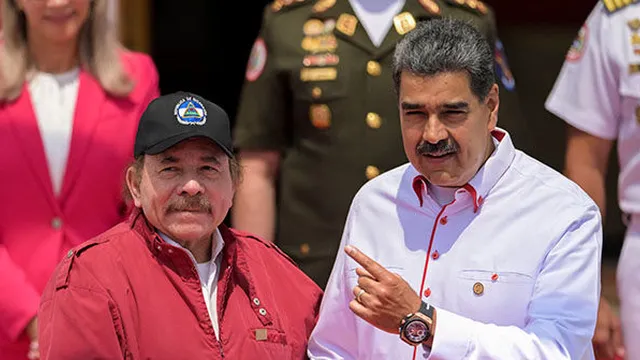
Nicaragua"s Ortega offers combatants to support Maduro in Venezuela
2024-08-27 00:00- Daniel Ortega offered to send Sandinista combatants to support Nicolás Maduro amid rising tensions in Venezuela.
- The online meeting of the Bolivarian Alliance focused on backing Maduro following a disputed election and subsequent protests.
- Ortega's remarks highlight the solidarity among leftist leaders in Latin America against perceived external threats.
Express your sentiment!
Insights
During a recent online meeting of the Bolivarian Alliance for the Peoples of Our America, Nicaraguan leader Daniel Ortega expressed his willingness to send Sandinista combatants to support Nicolás Maduro in Venezuela. This offer comes amid escalating tensions following a disputed presidential election in Venezuela, where Maduro's regime has faced significant opposition and protests. Ortega warned Maduro of a potential civil war scenario similar to Nicaragua's past conflicts, suggesting that external forces, particularly from Colombia and the United States, could instigate violence against his government. Ortega's comments reflect a broader concern among leftist leaders in the region regarding the stability of socialist governments in Latin America. He accused former Colombian presidents of potentially organizing a counter-revolution against Maduro, while also asserting that the current Colombian administration would not support such actions. The Nicaraguan dictator emphasized the need for Maduro to prepare for possible armed conflict, claiming that the situation could escalate significantly, involving various Colombian factions. The online gathering concluded with a statement supporting Maduro, praising his leadership and denouncing the Venezuelan opposition's rejection of the election results. The statement called for respect for Venezuela's sovereignty and self-determination, urging the international community to refrain from interference in internal affairs. This reflects a unified stance among leftist governments in the region, reinforcing their commitment to supporting each other against perceived imperialist threats. The situation in Venezuela remains precarious, with humanitarian groups reporting significant violence and repression against dissent. The international community's response to these developments will be crucial in determining the future stability of both Venezuela and Nicaragua, as well as the broader geopolitical landscape in Latin America.
Contexts
Nicolás Maduro's regime in Venezuela has faced significant opposition following the disputed presidential election on July 28, 2023, where he claimed victory despite evidence suggesting Edmundo González was the true winner. The National Electoral Council's declaration of Maduro's win has been widely contested, leading to violent protests and a crackdown on dissent, resulting in numerous deaths and arrests. Edmundo González Urrutia, a former presidential candidate, fled to Spain seeking asylum due to threats from Maduro's government. His departure occurred amid ongoing negotiations for a political transition, as opposition leaders, including María Corina Machado, work to protect political figures and push for democratic reforms. The U.S. has continued to enforce sanctions against Maduro, including the seizure of aircraft linked to him, as part of efforts to pressure his regime. International bodies have criticized the legitimacy of the election, and calls for accountability and support for the opposition have intensified. As the situation in Venezuela escalates, Maduro's government has intensified its repression, employing terror tactics against dissenters and utilizing advanced surveillance technologies to control the population. The political crisis highlights the urgent need for international support to facilitate a democratic transition in Venezuela.